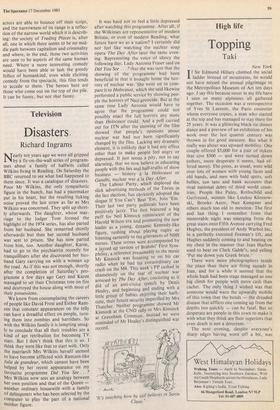Television
Disasters.
Richard Ingrams
Nearly ten years ago we were all gripped by a fly-on-the-wall series of program- mes about a family of halfwits called Wilkins living in Reading. On Saturday the BBC returned to see what had happened to them since. It was a catalogue of disasters. Poor Mr Wilkins, the only sympathetic figure in the bunch, has had a pacemaker put in his heart, but the resulting ticking noise proved the last straw as far as Mrs Wilkins was concerned. They split up short- ly afterwards. The daughter, whose mar- riage to the lodger Tom formed the highlight of the 1974 series, has also parted from her husband. She remarried shortly afterwards but then her second husband was sent to 'prison. She has now parted from him, too. Another daughter, Karen, had to go to the psychiatrist recently for tranquillisers after she discovered her hus- band Gary carrying on with a woman up the road. As if this was not enough, shortly after the completion of Saturday's pro- gramme a few days ago Gary and Karen managed to set their Christmas tree on fire and destroyed the house along with most of their possessions.
We know from contemplating the careers of people like David Frost and Esther Rant- zen that constant appearances on the telly can have a dreadful effect on people, turn- ing them into zombies and harridans. So with the Wilkins family it is tempting smug- ly to conclude that all their troubles are a kind of apt retribution for becoming TV stars. But I don't think that this is so. I think they were like that to start with. Only the matriarch Mrs Wilkins herself seemed to have become afflicted with Rantzen-like folic de grandeur, which cannot have been helped by her recent appearance on my favourite programme Did You See ...? Mrs Wilkins now sees an analogy between her own position and that of the Queen another ordinary housewife with a family of delinquents who has been selected by the computer to play the part of a national mother figure. It was hard not to feel a little depressed after watching this programme. After all, if the Wilkinses are representative of modern Britain, or even of modern Reading, what future have we as a nation? I certainly did not feel like watching the nuclear soap opera The Day After later the same even- ing. Representing the voice of idiocy the following day, Lady Antonia Fraser said on Did You See . . . ? that she was sure that the showing of the programme had been beneficial in that it brought home the hor- rors of nuclear war. She went on to com- pare it to Holocaust, which she said likewise performed a public service by showing peo- ple the horrors of Nazi genocide. But at the same time Lady Antonia would have to agree that the programme could not possibly enact the full horrors any more than Holocaust could. And a poll carried out for ITN after the showing of the film showed that people's opinions about nuclear war had not been significantly changed by the film. Lacking any dramatic element, it is unlikely that it had any effect other than to make people feel angry or depressed. It just seems a pity, not to say alarming, that we now believe in educating people with the lies and half-truths of show business — history et la Holocaust or Gandhi, nuclear war a la Day After. The Labour Party, which deplored the slick advertising methods of the Tories in the last election, has obviously adopted the slogan If You Can't Beat 'Em, Join 'Em. Their last two party politicals have been positively jazzy. The first featured a big puff for Neil Kinnock reminiscent of the Harold Wilson era and promoting the new leader as a young, dynamic Kennedy-like figure, rushing about playing rugby or listening earnestly to the grievances of NHS nurses. These scenes were accompanied by a jazzed up version of Brahms' First Sym- phgny, a reference presumably to the music Mr Kinnock was listening to on his car radio when he had his extraordinary car crash on the M4. This week's PP cashed in shamelessly on the fear of nuclear war aroused by The Day After, consisting as it did of an anti-cruise speech . by Denis Healey, and beginning and ending. with a
little group of babies enjoying
time, bath- time, their future security imperilled by Mrs
Thatcher. Neither programme showed Mr Kinnock at the CND rally or Mrs Kinnock at Greenham Common. Instead we were reminded of Mr Healey's distinguished war record.
'It's touching how he still believes in Santa Claus.






































































 Previous page
Previous page